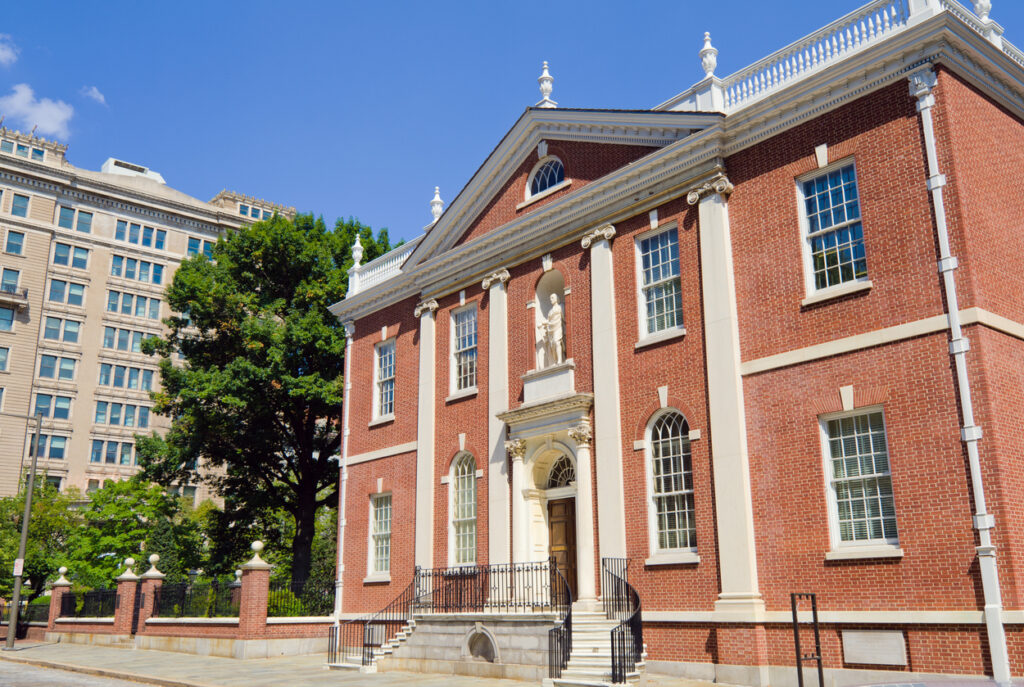Editor’s Note: Today’s post is by Jon Repetti. He is a PhD candidate in English Princeton University and a Fellow at the American Philosophical Society Press.
The American Philosophical Society Press is the oldest continuously operating scholarly press in North America. In over 250 years, hundreds of books and thousands of articles have passed through our offices in Philadelphia. The backlist reads like a Cooperstown of American intellectuals, featuring everyone from Benjamin Franklin to J. Robert Oppenheimer, from the anthropologist Margaret Mead to the science historian Otto Neugebauer, from the linguist Peter Stephen Du Ponceau to the ornithologist Robert Cushman Murphy.
In partnership with the University of Pennsylvania Press and De Gruyter, the APS Press is in the process of digitizing this vast backlist, with the goal of making every volume ever printed easily available in the modern marketplace. This has not been an easy task, as no complete list of all APS Press publications has ever been produced. Things inevitably get lost in the shuffle of 250 years in the book business, especially when many of the works in question were published before modern cataloging practices became widespread and before Library of Congress numbers even existed.

Over the past year, we have identified over 1,000 titles and are in the process of locating physical copies for each of them, which we will catalog and ship to Germany for digitization in partnership with De Gruyter, which will hold library distribution rights for three years. We hope that the majority of the backlist will be ready for immediate distribution around the world by the end of 2024. This digitization effort is part of a broader relaunch campaign, which will also feature new book series edited by leading scholars.
The APS Press is officially re-entering the fray of the scholarly publishing marketplace, reviving our past while building our future, one book at a time.
My role in all this started out modestly enough. I was a 6th-year PhD candidate in English at Princeton, depressed about the academic job market and hoping to get a coveted foot-in-the-door in the publishing industry. I spent a few months sending applications to every entry-level job at every publishing house east of the Mississippi, almost all of which fell directly into the void, before I finally managed to connect with APS Press Interim Director Peter Dougherty.
After a brief phone-call and a long lunch at a French restaurant (I ordered the mussels and immediately spilled hot butter on my only good shirt), I learned that my prospective new boss had run Princeton University Press for twelve years, and that he had recently retired. Somehow, the APS managed to pull him out of retirement to lead the first leg of their relaunch. I realized that I was about to get a real crash course in publishing, and I decided to jump in headfirst.
I drove to Philadelphia on a cold morning in January of 2024 — the first time I had ever set foot within city-limits. After narrowly avoiding three different car accidents and purchasing an 8AM cheesesteak, I walked halfway across Old City, and found the Press office in the basement of Philosophical Hall. There, Peter caught me up to speed on the digitization project: its scale, its importance for American intellectual history, and the numerous challenges involved. I went to work that afternoon, joining a small team from Penn Press to track down books in library archives, online databases, offices belonging to Society leadership, and the Borgesian attic of the APS library. (I wrote about my time in the attic on the APS Blog.)
The search for more titles is ongoing, and I have no doubt they will keep cropping up. One must imagine Sisyphus happy. Thankfully, the first phase of manic book-hunting is finally winding down, which has given us some time to pause and analyze the titles found. I’ve been hard at work on this analysis over the past couple months — reading hundreds of books and articles to get a better sense of the Press’s history, tracking trends in our output over time, and assessing the sales potential of individual texts, as well as developing a proposal and scholarly apparatus for APS Classics, our reprint series.
What first appeared as a haphazard grab-bag of almost every scientific and humanistic discipline active over the past three centuries slowly transformed into a coherent corpus, a braid of various trend-lines, all of them wrapped around one central cord: the distinctly Franklinian term, “useful knowledge.” In Franklin’s own words, useful knowledge covers “all philosophical Experiments that let Light into the Nature of Things, tend to increase the Power of Man over Matter, and multiply the Conveniences or Pleasures of life.” Or, to cite a contemporary definition from economist Joel Mokyr: useful knowledge is the aggregate of all the propositional and prescriptive knowledge a society has, the sum total of beliefs about the world and techniques for manipulating it to human ends.
The APS began as an organization devoted to natural science, modeled on the Royal Society in London. It put leading colonial intellects in conversation with one another and commissioned experiments such as David Rittenhouse’s famous “Transit of Venus” observations, which accurately measured the distance between the earth and the sun. Under the leadership of Thomas Jefferson, the Society expanded into the fields of ethnography and philology, and even assisted in outfitting and training members of the Lewis and Clark expedition.
Through the 19th century, journals hosted debates over Darwinian evolution, and became a major battle ground of the so-called Bone Wars, a famous rivalry between two APS members Edward Drinker Cope and Othniel Charles Marsh to discover more dinosaur species. The 20th century not only welcomed luminaries in the fields of genetics, and quantum physics into their ranks, but also social scientists and humanists of all stripes, from economists to archaeologists, from medieval historians to literary theorists, and beyond. The Press’s publishing output mirrored this expansion of focus, and by the 21st century it had built a strong list in the history of science, early American history, archaeology, and numerous other disciplines.
We found in these books an intellectual ethic that has remained remarkably consistent across Press publications from its inception: a rigorous and precise pursuit of facts, always with the purpose of unfolding the larger implications of those facts; a palpable desire to contribute to the advance of a given discipline without remaining within the boundaries of received methodologies; an urgent need to speak clearly across disciplinary lines without diluting any of the key points; and finally a spirit of liberal inquiry determined to follow the investigation wherever it may lead, born of a confidence that all genuine knowledge is, by definition, useful.
I spent several months reading through the backlist and learning everything I could about the history of the APS itself. I constructed spreadsheets to take a 10,000-foot view of the terrain, restricting myself to reading titles and abstracts in the first pass. This gave me a sense of the Press’s complex disciplinary history. But the spirit of the Press only became clear to me after I began to delve deeper into individual books, ultimately reading dozens of them cover-to-cover. This sort of time-consuming, qualitative analysis may seem dreadfully inefficient, and perhaps it is. But it has also been necessary in our case.
Large-scale quantitative analyses — with or without the help of AI tools — can trace disciplinary trends, identify shifts in methodology, track sales, and provide a wealth of other information at the macro-level. But only by actually reading the books with human eyes and human minds could we register the shared ethos of the works — beyond the mere content of their specific studies — and thereby begin to grasp the mission of the APS Press as a publishing enterprise.
Peter Dougherty likes to say that “great publishing is about something.” It would seem from this brief history that APS Press publishing is about everything. This is not simply a question of branding — “come to Princeton University Press for great books in economics,” “check out University of Chicago Press for the next hot thing in sociology,” and so on — but one of mission. The range I have described is remarkable for a small press that, even at the height of its output in the mid-20th century, was releasing fewer than 20 books per year.
Nonetheless, a long time spent immersing ourselves in the backlist has convinced us that the concept of “useful knowledge” holds these various applied and human sciences together, constituting both a logic of the past and a mission for the future. With this in mind, we are launching a unique publishing venture, one which may at first glance appear untimely, but which we believe is surely needed here and now: a press devoted to promoting and exploring the dynamics of useful knowledge in today’s multidisciplinary context through its legacy, history, sources, and contemporary applications and models.
Discussion
4 Thoughts on "Guest Post — Learning from the Archives to Build the Future at the APS Press"
What a great story. Made my day.
At a time when a flood of AI-generated cruft has forced Amazon to limit the number of ebooks that authors can self-publish on its platform to three per *day*, it is nice to be reminded that books are in fact a human enterprise, meant to be read “with human eyes and human minds.” Best of luck to APS Press in this endeavor, and congratulations on your thoughtful approach.
The work that Peter, Jon, and the rest of the APS team have done to reinvigorate the APS Press is incredibly admirable. Thanks for sharing this, Jon!
This made my day, too. What a dreamy job!
Very glad to learn about this massive digitization effort. I have ordered and used printed versions of past APS publications, and am happy that in the future I can read them online. Two were vital for my new APS on clockmaker Edward Duffield: of course the three hardcover volumes of “Patriot Improvers;” and the 2012 republication of Rittenhouse and Ewing essays on the 1769 Transit of Venus.



